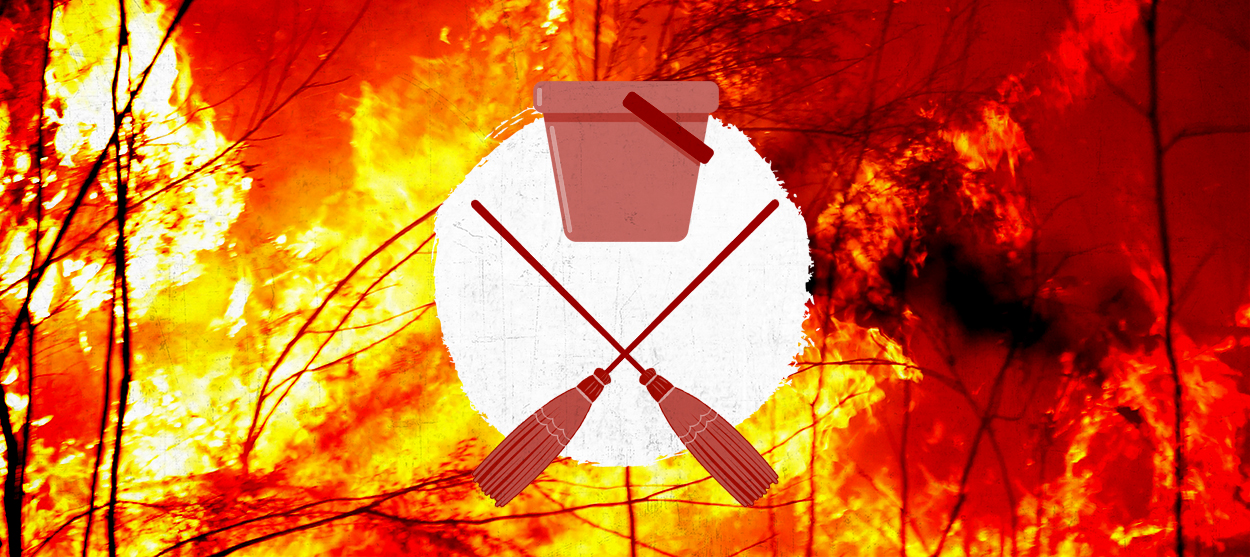'Mops and buckets' won't do anything to save us from climate disaster
The president's sadly succinct summary of America's approach to disaster preparedness


A free daily email with the biggest news stories of the day – and the best features from TheWeek.com
You are now subscribed
Your newsletter sign-up was successful
Hurricane Sandy brought a 14-foot tide of water through the streets of New York City and devastation along the coast of New Jersey in 2012. Over 50 people were killed. FEMA estimated a cost of $70.2 billion, making it at the time the second costliest hurricane is U.S. history. In the seven years since, the recovery has progressed slowly. Many homeowners have struggled to navigate a complex and inadequate system of government aid and insurance money.
In the wake of Sandy, many have considered the future climate change-driven risks to the city, including rising seas and the potential for more destructive storms. Proposals to mitigate these dangers have ranged from wetland restoration, buy-out programs, and oyster reefs that could protect New York City from flooding. In a nation that loves big infrastructure projects, one proposal has captured significant attention: building a six-mile long barrier to protect the city. The idea has been discussed for years but early last week The New York Times wrote an article confirming that the barrier is one of five projects being considered by the Army Corps of Engineers.
Presumably it was this article that led President Trump to tweet his own plan for protecting the largest city in America: "mops and buckets."
The Week
Escape your echo chamber. Get the facts behind the news, plus analysis from multiple perspectives.

Sign up for The Week's Free Newsletters
From our morning news briefing to a weekly Good News Newsletter, get the best of The Week delivered directly to your inbox.
From our morning news briefing to a weekly Good News Newsletter, get the best of The Week delivered directly to your inbox.
There's plenty to parse in the tweet. The $200 billion price tag is an exaggeration from the $119 billion reported by the Times. He denies the city's increasing flood risk. And concerns about the aesthetics of a wall are intriguing given his propensity for other walls, not just at the U.S.-Mexico border but also a sea wall to protect his golf course in Ireland.
This doesn't mean there aren't valid and very serious questions about the most effective and just approach to protecting New York and New Jersey from flooding. But these serious questions deserve to be answered with serious solutions. "Mops & buckets" is dismissive and reminiscent of the president throwing paper towels at Puerto Ricans in the wake of Hurricane Maria. It is also a dangerous return to the antiquated, reactive approach historically taken to emergency management.
For most of U.S. history, we have done relatively little to prevent disasters from happening. Despite decades of pleas from scholars and emergency management practitioners, we wait for disasters to hit and then we deal with the consequences. Instead of putting more effort and resources into hazard mitigation and preparedness, to prevent disasters from happening in the first place and to ready communities for those we can't, we devote ourselves to response and recovery.
Now, as our national risk changes in the face of the climate crisis there is even more value in implementing mitigation measures before a disaster happens. A frequently cited 2018 report from the National Institute of Building Sciences found that for every $1 the federal government spends on hazard mitigation, $6 is saved in response and recovery. Doing mitigation pre-disaster isn't just financially smart, it also saves lives. The same report found that the implementation of just some mitigation strategies could "prevent 600 deaths, 1 million nonfatal injuries and 4,000 cases of post-traumatic stress disorder." These findings have been echoed in more blunt statements like that from New York City Mayor de Blasio who tweeted in response to Trump, "Your climate denial isn't just dangerous to those you've sworn to protect — it's deadly."
A free daily email with the biggest news stories of the day – and the best features from TheWeek.com
During the Trump administration, the U.S. has seen staggering disaster-related death tolls. The Camp Fire in California became the deadliest in state history with an estimated 86 deaths. The official government death toll for Hurricane Maria now stands at 2,975, making it one of the deadliest disasters in U.S. history, and an independent study estimated the actual number could be closer to 5,000. In 2017, the Phoenix area faced a record-breaking 155 heat-related deaths.
Many of the factors that have created these disasters were solidified long before Trump took office — the long colonial history in Puerto Rico, development decisions in Houston, and underinvestment in levees in the Midwest have all contributed to the disasters of the last few years. This administration is responsible for the federal response to these disasters — responses that have not always been effective. There have been disruptive and continual leadership changes at FEMA, and turbulent relationships between the White House and local politicians. Specific policies have hampered the ability of various emergency management agencies and communities to take measures to protect constituents such as moving funding from FEMA to ICE and restricting the use of federal dollars in post-Maria Puerto Rico.
While certainly there is a stark difference between Democrats and Republicans on issues of emergency management, there is still a disconnect between what national Democratic leaders are saying and doing, as a whole, and what scientists expect our risks to be and what frontline communities are already experiencing.
During a September town hall on climate change hosted by CNN, a member of the audience shared that her daughter had been killed during Superstorm Sandy. She asked Joe Biden what specific policies he would implement in his first year as president to "mitigate the impact of climate change." His answer was about efficiency standards for appliances and charging stations, conflating the prevention of disasters with taking action on climate change. This has been the dominant narrative among all the Democratic presidential candidates. It's true that taking action on climate change is important for reducing the number of future disasters, but it's also true that we can't prevent all future disasters just by taking action on climate change.
Discussion of emergency management policy has been largely absent among the democratic debates, forums, and climate plans, despite the continual usage of recent disasters to frame conversations about climate policy. When candidates have been asked about their plans for communities experiencing disasters, a frequent answer is "managed retreat." But there is little to no explanation about what this entails. This was reiterated at the most recent debate where candidates were asked what to do about flooded farms and factories in the Midwest.
A key challenge of disaster mitigation is that for efforts to be effective they must be taken pre-disaster. This requires an accurate understanding of our risk in a changing climate and requires politicians to think about the future. It means making investments now, even though the benefits may not be felt for decades.
It's estimated that the six-mile barrier proposed for New York City will take 25 years to build, although anyone with experience working on large scale infrastructure projects is sure to tell you it will take longer. Following in the footsteps of the levee system in New Orleans, the MOSE barrier in Venice, and the flood infrastructure projects in the Netherlands, we know there are serious environmental consequences, big budgets, and the risk that it will not work. We need to act quickly because time is not on our side.
The solution to this challenge though is not to ready our mops and buckets, but rather to keep searching for the approaches that are effective, efficient, and just.
Want more essential commentary and analysis like this delivered straight to your inbox? Sign up for The Week's "Today's best articles" newsletter here.
Samantha Montano is an assistant professor of emergency management and disaster science at University of Nebraska Omaha. She has a doctoral degree in emergency management and writes at Disaster-ology.
-
 How Democrats are turning DOJ lemons into partisan lemonade
How Democrats are turning DOJ lemons into partisan lemonadeTODAY’S BIG QUESTION As the Trump administration continues to try — and fail — at indicting its political enemies, Democratic lawmakers have begun seizing the moment for themselves
-
 ICE’s new targets post-Minnesota retreat
ICE’s new targets post-Minnesota retreatIn the Spotlight Several cities are reportedly on ICE’s list for immigration crackdowns
-
 ‘Those rights don’t exist to protect criminals’
‘Those rights don’t exist to protect criminals’Instant Opinion Opinion, comment and editorials of the day
-
 The billionaires’ wealth tax: a catastrophe for California?
The billionaires’ wealth tax: a catastrophe for California?Talking Point Peter Thiel and Larry Page preparing to change state residency
-
 Bari Weiss’ ‘60 Minutes’ scandal is about more than one report
Bari Weiss’ ‘60 Minutes’ scandal is about more than one reportIN THE SPOTLIGHT By blocking an approved segment on a controversial prison holding US deportees in El Salvador, the editor-in-chief of CBS News has become the main story
-
 Has Zohran Mamdani shown the Democrats how to win again?
Has Zohran Mamdani shown the Democrats how to win again?Today’s Big Question New York City mayoral election touted as victory for left-wing populists but moderate centrist wins elsewhere present more complex path for Democratic Party
-
 Millions turn out for anti-Trump ‘No Kings’ rallies
Millions turn out for anti-Trump ‘No Kings’ ralliesSpeed Read An estimated 7 million people participated, 2 million more than at the first ‘No Kings’ protest in June
-
 Ghislaine Maxwell: angling for a Trump pardon
Ghislaine Maxwell: angling for a Trump pardonTalking Point Convicted sex trafficker's testimony could shed new light on president's links to Jeffrey Epstein
-
 The last words and final moments of 40 presidents
The last words and final moments of 40 presidentsThe Explainer Some are eloquent quotes worthy of the holders of the highest office in the nation, and others... aren't
-
 The JFK files: the truth at last?
The JFK files: the truth at last?In The Spotlight More than 64,000 previously classified documents relating the 1963 assassination of John F. Kennedy have been released by the Trump administration
-
 'Seriously, not literally': how should the world take Donald Trump?
'Seriously, not literally': how should the world take Donald Trump?Today's big question White House rhetoric and reality look likely to become increasingly blurred
